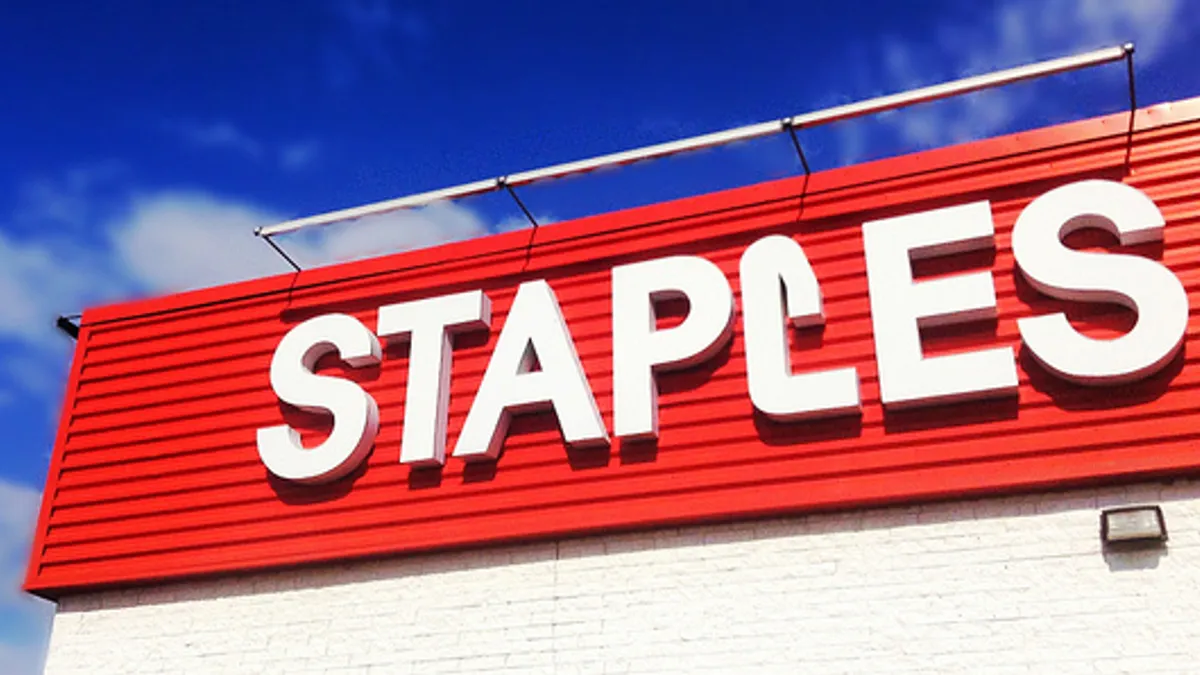Dive Brief:
-
Cost-cutting and recovery in its commercial office supplies business helped lift Staples in the first quarter: The company reported that Q1 North America commercial sales rose 0.4% to $2.12 billion. Total sales fell 1% year over year in the quarter, after excluding the impact of foreign exchange rate fluctuations and store closures during the past year.
-
First quarter earnings per share were 17 cents, flat from the prior year’s first quarter, on revenue of $5.1 billion, compared to $5.26 billion year over year. That beat analyst estimates for 16 cents per share on revenue of $5.09 billion, according to a Thomson Reuters consensus estimate. Shares rose more than 1% in premarket trading after the company issued its report.
-
Same-store sales fell 4% in the first quarter while sales in North America dropped 5.2% to $2.25 billion.
Dive Insight:
Staples, along with rival Office Depot, is facing the prospect of reconsidering its business strategy after the two companies' planned $6.3 billion merger was knocked down when a judge granted a Federal Trade Commission injunction against it over antitrust concerns.
The merger of the two companies would have created an international office supply Goliath that would have relied on its impressive brick-and-mortar presence to neutralize the growing threat posed by online competition. But that was a bit too much for the FTC, and ultimately for U.S. District Court Judge Emmet Sullivan in the District of Columbia.
Office Depot this week said it had ordered a strategic review of its business after the failed merger, and Staples will likewise have to consider its options. The company said previously that it plans to close around 50 North American stores this year.
Recent earnings reports suggest that both Staples and Office Depot now face grim futures. Speaking on a March conference call after Staples reported underwhelming Q4 2015 results and revealed plans to close 50 stores this year, Staples CEO Sargent said the FTC took “an incredibly narrow” definition of Staples’ office supply business. He added that the company had been mulling contingency plans for several months in case the Office Depot deal was blocked.
One way for Staples to shake up its business lies in its plans to partner with office-space sharing startup Workbar to set up co-working spaces in three stores, says Scott Wagner, a partner in Bilzin Sumberg’s Litigation Group. But he also said that has its limits.
The Staples/Workbar agreement is a quintessentially modern solution to an age-old retail problem, leveraging the principles of the gig economy to repurpose fallow Staples store space while still maintaining the retailer's raison d’être. But while the basic setup of the deal has some analysts praising its ingenuity, others question its sustainability.
“It will really take a considerable change in thinking and culture and the business to really embrace that type of business wholeheartedly, and I’m not sure it would be enough to cover their costs in huge retail centers,” Wagner told Retail Dive. “What you might start to see is a shrinking number of stores and shrinking size of stores—you see these stores, they’re tremendous. They could devise a model where they maybe keep less stock on site.”
















